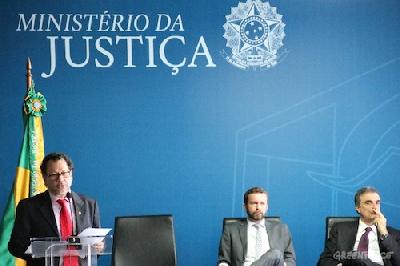News
Brazil - government appoints new FUNAI president

João Pedro (left) delivers his inauguration speech. To the right: ex-FUNAI interim president Flávio Chiarelli, and Minister for Justice José Eduardo Cardozo (© Alan Azevedo/Greenpeace)
Source: greenpeace.org/brasil
Although Indigenous peoples had suggested another candidate, it is former senator for PT Amazonas João Pedro who assumes presidency, a job which the Minister for Justice considers ‘the hardest role in the Republic’.
In contradiction with what APIB (the Articulation of Indigenous Peoples of Brazil) had asked in a public request to the government, President Dilma Roussef nominated former senator João Pedro as the new president of the FUNAI (National Indian Foundation). At the start of the month, APIB had suggested the then-interim president Flávio Chiarelli.
João Pedro, an agricultural engineer, was the head of the National Institute of Colonization and Agrarian Reform (INCRA) and currently leads the PT directory in Amazonas State, which he also represented as Senator. The inauguration took place today (June 17th) at the Palace of Justice in Brasilia, in the presence of the Minister of Justice, José Eduardo Cardozo.
The new president confirmed he would maintain constant, meaningful dialogue with indigenous representatives and referred to initiatives of the Congress against the rights of indigenous peoples. “In willing to please Minister Cardozo, we shall continue discussions of the situation’s inherent challenges, above all those which consist in legal acts and which intend to deconstruct historic achievements of the 1988 Constitution”, declared João Pedro during his inauguration.
After eight months as interim president of the FUNAI, Flávio Chiarelli now serves as indigenous advisor to the Ministry of Justice. Chiarelli believes that the government has a non-indigenous stand on traditional peoples, “believing them to be the cause of problems, when in reality we must stop gazing into space and must start acknowledging the problem’s true cause”.
In his speech, the Minister of Justice declared that not everything in the Federal Constitution is carried out nor is part of day-to-day reality. “The Constitution of 1988 indicates what ought to be the right of indigenous peoples, in other words the demarcation of land. Guarantees that have never been fulfilled were laid out in this text. Nevertheless, we would be mistaken to think that these ideologies have already been achieved or that our duties can be fulfilled without obstacles”, he said.
Thus, Cardozo labeled João Pedro’s new job as one of the country’s most challenging roles: “the job of president of the FUNAI is frequently believed to be the hardest of the Brazilian Republic given the obstacles presented by prejudice and by an array of situations that are more and more visible to us each day”.
“Once again FUNAI starts from scratch with a new president. This is known as a short-term role as the president is always changing. Consequently, neither FUNAI administration nor indigenous politics can be continuous”, says Danicley de Aguiar from the Greenpeace Amazon campaign.
Mission
According to Manaus journal A Crítica, João Pedro is said to have received a mission from Minister for Justice, José Eduardo Cardozo, to show that the FUNAI does not just deal with indigenous land demarcation.
“In the context of strong legalization dispute, the Minister for Justice’s objective is worrying”, defends Aguiar. However, it remains to be seen whether João Pedro’s compromise will be part of the Amazon development agenda, which attributes to traditional peoples the status of anti-development perpetrators, or part of the constant defense of indigenous rights, which privileges the construction of a fair and ethical society.
“Indeed, FUNAI does not only take care of indigenous land demarcation. However, this subject seems to have taken control of the national indigenous agenda, whether in Congress, the Judiciary or the Executive, triggering hard-hitting reactions against native rights”, explains Aguiar, noting that conflicts involving land disputes are especially visible in Mato Grosso do Sul, Bahia, Rio Grande do Sul and Amazônia, among others.
The indigenous territory of Sawré Muybu, claimed by the Munduruku people in the Rio Tapajós region, is an example of how the development agenda endangers native rights, given FUNAI’s silence concerning the continuity of the land demarcation process of over ten years; especially after the government declared an interest in constructing the São Luiz do Tapajós hydroelectric plant on this territory.
Whether we accept it or not, the reality is that indigenous territories fulfil an important role in protecting national forests, which contribute to the already fragile climate equilibrium, seeing as worldwide deforestation is responsible for a considerable amount of greenhouse gas emissions. Therefore it is only strategical that the process of indigenous recognition and land demarcation become FUNAI’s priority once again. Everything depends on its new president's commitment.
© Greenpeace Brasil - translated by Felix Charnley / original article
Date : 17/06/2015
